|
The Railroad Branch of
the Y.M.C.A.
BY G. J. WARBURTON
WHETHER considered as an expression of the generally pervading
altruistic spirit, a manifestation of the American eagerness for
self-help, or as an evidence of the vitality of the religious
forces of our times, the Railroad Branch of the Young Men's Christian
Association is deserving of recognition and study. It has been
called the largest club of working men in the world. It is doing
a welfare work of sufficient size and success to put it in the
front rank among such enterprises, and on the railroad it has
made a permanent place for itself and is generally regarded as
a desirable, and in most cases an indispensable, agency for good.
Its status may be seen by the fact that companies controlling
eighty per cent of the railroad mileage of the United States support
the associations of which there are now 202 with a membership
of 65,000, and annual current expenses of $625,000, of which the
companies contributed forty per cent and men sixty per cent. The
number of secretaries now employed is 337, and the value of the
buildings more than $1,800,000.
In nearly all parts of the world some kind of good work is
being done for railroad employees. In Russia a splendid system
of pensions is in operation, and besides cooperative stores there
are schools of various grades as well as churches with attendant
priests devoted entirely to the use of railway employees and their
families. In Germany also pensions are paid to old employees and
to the widows and orphans of those deceased. Homes and rest rooms
of various kinds are provided with baths, libraries and kitchens,
and besides these things a large number of associations composed
of railroad men conduct various kinds of welfare work. In Great
Britain the Railway Mission is aggressive as an evangelistic agency
and pushes its work in halls, goods sheds, stations, and wherever
groups of railroad men are found. It has also extended its activities
to South Africa, India and Japan.
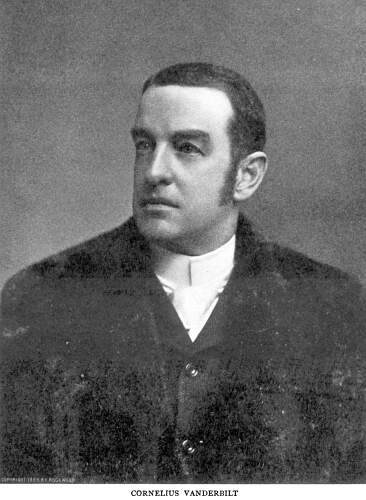 The Young Men's
Christian Association began its labors among railroad men in 1872
in the city of Cleveland, Ohio, through the agency of an employee
who had been discharged for drunkenness but who had recently reformed
and entered upon a life of active Christian service. He invited
a minister to preach to railroad people in the waiting room of
the station, the officers of the companies controlling it having
placed it at his disposal. Crowds of people attended, a revival
broke out among the men, and as a result of it and the difficulty
of managing it, the first branch of the Young Men's Christian
Association composed of railroad men was formed. It was not long
before a reading room was opened and the organization properly
housed in the Union Depot. The first outreach of the new society
was to men along the line of the Lake Shore Railroad, and great
meetings in round houses, led by delegations of earnest men, were
a feature of that period. The secretary was a man of unquenchable
zeal, and devoted his time largely to the visitation of the sick,
the distribution of religious literature, and the conduct of the
evangelistic meetings. One of the earliest friends whose influence
was a great aid in those early days was General John H. Devereaux,
then the president of the C. C. C. & I. road and a prominent
citizen of Cleveland. He afterwards testified that in the strike
days of 1877 it was through the influence of the Christian
work done among the men in Cleveland that they stood out against
riots and disorder. The Young Men's
Christian Association began its labors among railroad men in 1872
in the city of Cleveland, Ohio, through the agency of an employee
who had been discharged for drunkenness but who had recently reformed
and entered upon a life of active Christian service. He invited
a minister to preach to railroad people in the waiting room of
the station, the officers of the companies controlling it having
placed it at his disposal. Crowds of people attended, a revival
broke out among the men, and as a result of it and the difficulty
of managing it, the first branch of the Young Men's Christian
Association composed of railroad men was formed. It was not long
before a reading room was opened and the organization properly
housed in the Union Depot. The first outreach of the new society
was to men along the line of the Lake Shore Railroad, and great
meetings in round houses, led by delegations of earnest men, were
a feature of that period. The secretary was a man of unquenchable
zeal, and devoted his time largely to the visitation of the sick,
the distribution of religious literature, and the conduct of the
evangelistic meetings. One of the earliest friends whose influence
was a great aid in those early days was General John H. Devereaux,
then the president of the C. C. C. & I. road and a prominent
citizen of Cleveland. He afterwards testified that in the strike
days of 1877 it was through the influence of the Christian
work done among the men in Cleveland that they stood out against
riots and disorder.
In 1875 the Cleveland men felt that they must visit other important
railroad centers to tell what had been done and to induce other
railroad men to band themselves together and other managers to
give their assistance. New York City was one of the first places
visited. The Grand Central Depot had become the headquarters of
the New York Central system, and the officers of its affiliated
lines then, as now, made frequent business visits to it. General
Devereaux had spoken of the work in Cleveland to members of the
Vanderbilt family. "Young Cornelius," as he was then
called, had entered the treasurer's office of the Harlem Railroad
as a clerk. He was an active worker in St. Bartholomew's Episcopal
Church and had recently become a member of the board of directors
of the Young Men's Christian Association of New York. The visitors
from Cleveland found him deeply interested in their story, which
was a thrilling one, and which was told with all the fervor and
fire of zealous advocates of a good cause. Soon a basement room
was found for a reading room, and the work was established in
the commercial center of the New World. New York assumed a very
influential relation to the movement partly on account of its
place of leadership in railroad matters but chiefly owing to the
devotion of Mr. Vanderbilt to the cause, a devotion that continued
up to the time of his death in 1899. The International Committee,
of which the late William E. Dodge, Morris K. Jessup and Mr. Vanderbilt
were members, secured a secretary in the person of Edwin D. Ingersoll,
a natural promoter and one of the original group of Cleveland
association leaders, and the work was urged upon the railroad
officers of the country and their support enlisted. In one of
his early reports Mr. Ingersoll says:
"A library for railroad men was established
by officers of the Passumpsic Railroad Company at St. Johnsbury,
Vt., in 1850, another by officials of the Vermont Central Railroad
Company, at Northfield, Vt., in 1852, and another by Messrs. Peto,
Beets and Brassey, contractors, while building the Victoria Bridge
at Montreal, in 1854. Many others have since been established
throughout the country. A few of them survive. The great majority
of these library organizations are dead, and in many cases nothing
can now be found to show that they ever existed . . . . . As a
rule, they were used only by men of good habits and of some literary
taste. There was not sufficient social or other influence connected
with them to draw men away from evil resorts; there was no aggressive
reformatory force."
The railroad branches supply this reformatory force. As a recent
writer has put it, "they introduce the psychological motive
of religion."
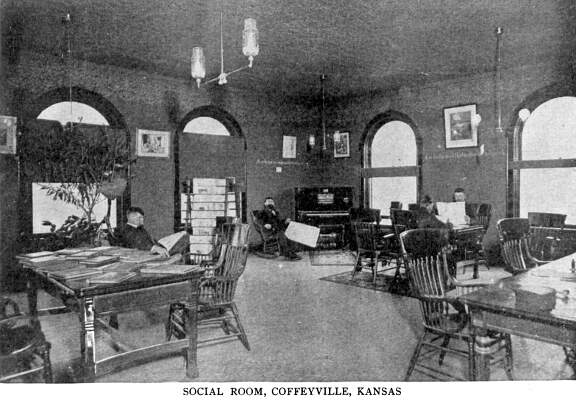 Mr. John P.
Green, first vice-president of the Pennsylvania Railroad, has
said: "To accomplish any great work there must be some strong,
guiding, impelling principle behind it. . . . . We believe that
in having the Young Men's Christian Association back of our work
we have secured cooperative force that is always pushing to the
front, and is making us do this great work not only for ourselves,
but for the community and the world which we are trying to serve." Mr. John P.
Green, first vice-president of the Pennsylvania Railroad, has
said: "To accomplish any great work there must be some strong,
guiding, impelling principle behind it. . . . . We believe that
in having the Young Men's Christian Association back of our work
we have secured cooperative force that is always pushing to the
front, and is making us do this great work not only for ourselves,
but for the community and the world which we are trying to serve."
I have given this brief sketch of the beginnings of Railroad
Young Men's Christian Association work as a background against
which to put the varied activities and recognized successes of
these later years. Originating among the men, it was not always
understood, and by the intensity of its religious fervor (in which
it was merely reflecting the conditions of the period in which
it was born) it estranged some. Railroad officials were not generally
sympathetic. 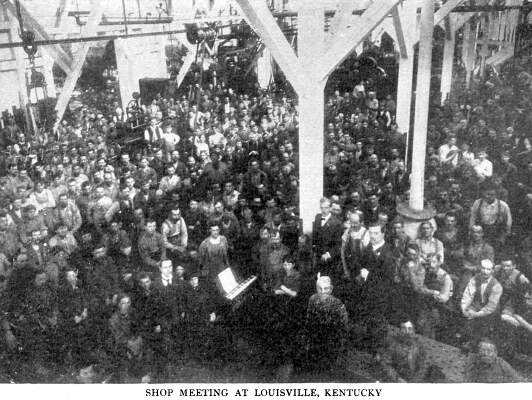 They
doubted its practical value and, when they had been won, many
of the men gave but lukewarm support. Gradually the activities
of the associations assumed most practical shape. To the reading
and lounging room were added the library, evening classes, lectures,
baths, rest rooms and dormitories, and later restaurants. Railroad
companies were led to invest larger sums of money, to furnish
better equipment. At first rooms in the station, over a freight
shed, or in a round house, were provided, and the experiment went
on with increasing success. One test that has always been applied
has been the ability of the association to keep railroad employees
out of the saloon, the brothel and the gambling resort. Railroading
in the old days attracted a type of men to whom vices of various
kinds made a strong appeal. It was a common thing for them to
be woefully lacking in good morals. Many were dissolute, and the
location of a terminal in a town was considered a calamity because
of the undesirable men who would thus be brought into it. It is
also true that the restraints that are around the working man
of the same social grade in other employment are lacking in a
railroad man's life. His hours are generally irregular. Much of
his time must be spent away from home. His labor is exhausting
to physical and nervous force to such an extent that the desire
for stimulants is stronger in its appeal than it might otherwise
be. Yet the nature of his responsibility is such that he must
be alert, sober, trustworthy. The rules of the railroads prohibit
the use of liquors while on duty. In fact the railroad employees
of the country constitute the largest army of temperance men in
the world. The brotherhoods, too, deserve much credit for their
attitude on the drink question. But it would be useless to prohibit
drinking and then force men to the places where liquor is sold
by compelling them to seek their food and rest in the cheap hotels
that are always found near terminal stations and yards. It is
here that the association serves both railroad officers and railroad
men. It competes with the saloon for the patronage of the engineers,
firemen, conductors, brakemen and the others, and it offers them
all of the needful things for which they must seek. They
doubted its practical value and, when they had been won, many
of the men gave but lukewarm support. Gradually the activities
of the associations assumed most practical shape. To the reading
and lounging room were added the library, evening classes, lectures,
baths, rest rooms and dormitories, and later restaurants. Railroad
companies were led to invest larger sums of money, to furnish
better equipment. At first rooms in the station, over a freight
shed, or in a round house, were provided, and the experiment went
on with increasing success. One test that has always been applied
has been the ability of the association to keep railroad employees
out of the saloon, the brothel and the gambling resort. Railroading
in the old days attracted a type of men to whom vices of various
kinds made a strong appeal. It was a common thing for them to
be woefully lacking in good morals. Many were dissolute, and the
location of a terminal in a town was considered a calamity because
of the undesirable men who would thus be brought into it. It is
also true that the restraints that are around the working man
of the same social grade in other employment are lacking in a
railroad man's life. His hours are generally irregular. Much of
his time must be spent away from home. His labor is exhausting
to physical and nervous force to such an extent that the desire
for stimulants is stronger in its appeal than it might otherwise
be. Yet the nature of his responsibility is such that he must
be alert, sober, trustworthy. The rules of the railroads prohibit
the use of liquors while on duty. In fact the railroad employees
of the country constitute the largest army of temperance men in
the world. The brotherhoods, too, deserve much credit for their
attitude on the drink question. But it would be useless to prohibit
drinking and then force men to the places where liquor is sold
by compelling them to seek their food and rest in the cheap hotels
that are always found near terminal stations and yards. It is
here that the association serves both railroad officers and railroad
men. It competes with the saloon for the patronage of the engineers,
firemen, conductors, brakemen and the others, and it offers them
all of the needful things for which they must seek.
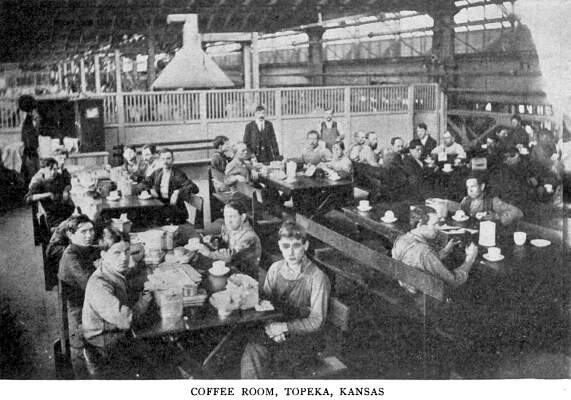 The social
rooms with games of various kinds are as free from unnatural restraint
as they can be made. The restraint is one of atmosphere, not of
rules. Mirth, sometimes of a boisterous nature, abounds in such
places. The "Stove Committee" may meet and talk about
bow the road should be run, with the confidence of a commuter,
and no one will be harmed. The engineer and the fireman from the
"head end" may smoke and chat with the men who punch
tickets, handle trunks or help the ladies on and off at the platforms
of the cars. Profanity and obscenity are tabooed. It is a club.
It is better than the saloon and cheaper. There is no gambling,
no drinking, but a wholesome, manly enjoyment of those recreative
features that bring freshness to the jaded body and new vigor
to the weary nerves. The social
rooms with games of various kinds are as free from unnatural restraint
as they can be made. The restraint is one of atmosphere, not of
rules. Mirth, sometimes of a boisterous nature, abounds in such
places. The "Stove Committee" may meet and talk about
bow the road should be run, with the confidence of a commuter,
and no one will be harmed. The engineer and the fireman from the
"head end" may smoke and chat with the men who punch
tickets, handle trunks or help the ladies on and off at the platforms
of the cars. Profanity and obscenity are tabooed. It is a club.
It is better than the saloon and cheaper. There is no gambling,
no drinking, but a wholesome, manly enjoyment of those recreative
features that bring freshness to the jaded body and new vigor
to the weary nerves.
The lunch rooms and restaurants furnish food at cost prices
and the patronage of some of them is very large. At Madison avenue,
New York, between seven and eight hundred meals are served daily.
The dormitories are very popular, and for a dime a member may
have a bed with clean linen and be sure to be called in time to
go out on his run. The reading rooms and libraries are supplied
with current literature and the best books; in some cases traveling
libraries are employed, and men at stations on the line are supplied
with books by train service. This is a great boon to the solitary
station agent who must also serve as telegraph operator, baggageman,
and express messenger, but whose work is miles from the nearest
public library, Practical talks upon such subjects as "The
Book of Rules," "Locomotive Repairs," "Reports
and How to Make Them," as well as evening classes on subjects
of value to railroad men, are useful and measurably popular.
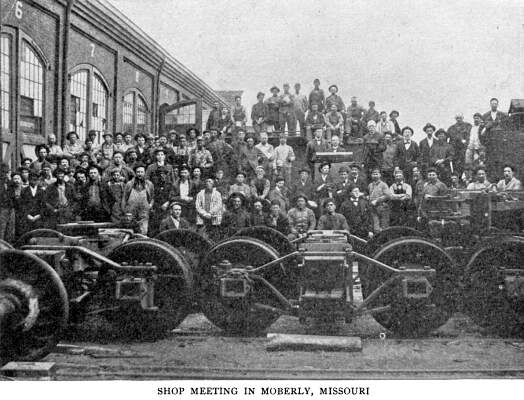 In the religious
meetings your typical railroad man appears at his best. He has
slight regard for conventionalities but goes straight to the heart
of things in his talk. Railroad phrases are numerous and brighten
into vividness speeches that might otherwise be prosaic. The engineer
speaks of men who lack "sand," whose "drivers slip,"
whose "headlight isn't burning." He tells of "throwing
her over" and shoving her down into the notch. The conductor
declares that there are no sleeping cars on the gospel train but
that every passenger travels on a pass! Flashes of wit follow
bursts of real pathos. Stolid and self-contained as railroad men
appear to the public, they are companionable and brotherly within
their own circle. Their sorrows and their joys are shared by their
fellows. They do not readily open the doors of their natures to
outsiders, but to be a railroader insures a friendly welcome.
Big burly men are often child-like in the depth and simplicity
of their emotional life. They hate shams and have an unusual power
of discrimination in reading men. The conductor spots the short
fare passenger, his place and his future depend to no small degree
upon his alertness, memory and tact. Every man must be, ready
for any emergency. Difficulties are to be overcome and not to
stop the train. The man who can only tell why he -didn't do a
certain thing will soon be crowded out. In the religious
meetings your typical railroad man appears at his best. He has
slight regard for conventionalities but goes straight to the heart
of things in his talk. Railroad phrases are numerous and brighten
into vividness speeches that might otherwise be prosaic. The engineer
speaks of men who lack "sand," whose "drivers slip,"
whose "headlight isn't burning." He tells of "throwing
her over" and shoving her down into the notch. The conductor
declares that there are no sleeping cars on the gospel train but
that every passenger travels on a pass! Flashes of wit follow
bursts of real pathos. Stolid and self-contained as railroad men
appear to the public, they are companionable and brotherly within
their own circle. Their sorrows and their joys are shared by their
fellows. They do not readily open the doors of their natures to
outsiders, but to be a railroader insures a friendly welcome.
Big burly men are often child-like in the depth and simplicity
of their emotional life. They hate shams and have an unusual power
of discrimination in reading men. The conductor spots the short
fare passenger, his place and his future depend to no small degree
upon his alertness, memory and tact. Every man must be, ready
for any emergency. Difficulties are to be overcome and not to
stop the train. The man who can only tell why he -didn't do a
certain thing will soon be crowded out.
The active agency in the extension of the railroad association
work has been the International Committee, and in several states
strong committees of railroad officials have pushed the work within
state lines. There are now seven international railroad secretaries
at work. Railroad centers are visited, the men and the companies
interested and organizations effected. Nearly all railroad managers
now welcome the association's cooperation and the men are easily
induced to enter the membership and to work on the various committees.
The labor unions are friendly and in many cases their members
actively -co6perate, though it is always understood that the association
has no direct relation to labor questions except as its teachings
tend to promote good feeling and its social and other work actually
brings employers and employees together and increases mutual respect.
This in itself is not a small contribution in these days of gigantic
corporations with the number of employees running into the tens
of thousands.
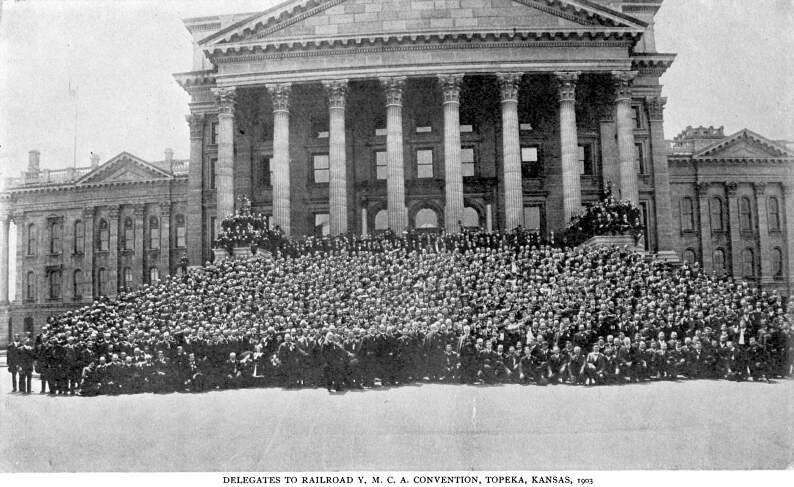
This solidification of the association work by means of a central
committee is further carried out by great conferences of delegates,
the last of which was held at Topeka, Kansas, in April, 1903,
and was attended by more than fourteen hundred delegates. President
Roosevelt made an address.
The faces of the delegates were a most interesting study. They
exhibited intensity, alertness, discrimination, sympathy, firmness,
confidence, expectation, in varying degrees. Some showed signs
of hard knocks in the battle of life. Firmly set jaws, and eyes
that looked out of cavernous depths, indicated natural force and
assertiveness. These were men who in the round house, the conductor's
room, the switch man's shanty, the caboose or the shop, would
compel attention. They would be likely to arouse 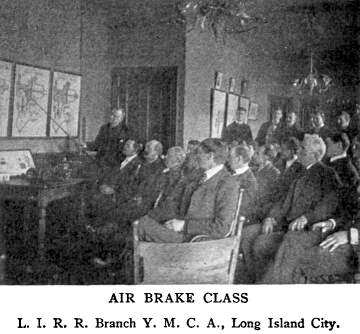 opposition because of their aggressiveness.
They never would be "ciphers in the midst of the figures."
Each man would count for one. There were faces there that indicated
innate refinement, and gentility which was more than a veneer.
These men were enjoying the heritage of a gentle mother and of
a home life where the sweetest influence prevailed. The chisel
of time had only served to bring out the fine lines. If you could
trace their pedigree you would discover that, like Timothy of
old, they had sprung from a stock which had been sanctified and
polished by an affectionate acquaintance with the word of God.
Of course there were some men in whom the sensual and brutish
were extremely strong. Their faces showed it. Waves of passion
which had swept through them had left their mark on lip, and brow,
and eye. They had been driven by appetite and showed signs of
that devilish master. Yet it was not hard to see in such men unmistakable
evidence of a new kingship and of the presence of a mightier power
which held the baser man in check. opposition because of their aggressiveness.
They never would be "ciphers in the midst of the figures."
Each man would count for one. There were faces there that indicated
innate refinement, and gentility which was more than a veneer.
These men were enjoying the heritage of a gentle mother and of
a home life where the sweetest influence prevailed. The chisel
of time had only served to bring out the fine lines. If you could
trace their pedigree you would discover that, like Timothy of
old, they had sprung from a stock which had been sanctified and
polished by an affectionate acquaintance with the word of God.
Of course there were some men in whom the sensual and brutish
were extremely strong. Their faces showed it. Waves of passion
which had swept through them had left their mark on lip, and brow,
and eye. They had been driven by appetite and showed signs of
that devilish master. Yet it was not hard to see in such men unmistakable
evidence of a new kingship and of the presence of a mightier power
which held the baser man in check.
Among those officers of railroads whose support has been most
generous and influential have been Cornelius Vanderbilt, George
B. Roberts, Chauncey M. Depew, A. J. Cassatt, M. E. Ingalls, Lucius
Tuttle, E. P. Ripley, W. H. Baldwin, Jr., George W. Stevens; E.
V. W. Rossiter, W. C. Brown, George J. Gould and W. H. Truesdale.
Miss Helen Gould has given large sums of money towards the general
work and for buildings and libraries upon the Gould lines.
Students of social progress may well regard such an enterprise
hopefully. It furnishes a platform upon which employer and employee
may meet and it has in it at least a suggestion as to the way
in which religion may be related to the actual life of men and
wage-earners be led into a better understanding of Him who was,
as Hugh Price Hughes was fond of calling Him, "The Mundane
Christ."
Stories Page | Contents Page
|







